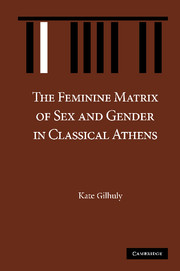Book contents
- Frontmatter
- Contents
- ACKNOWLEDGMENTS
- LIST OF ABBREVIATIONS
- 1 Introduction
- 2 Collapsing Order: Typologies of Women in the Speech “Against Neaira”
- 3 Why Is Diotima a Priestess? The Feminine Continuum in Plato's Symposium
- 4 Bringing the Polis Home: Private Performance and the Civic Gaze in Xenophon's Symposium
- 5 Sex and Sacrifice in Aristophanes' Lysistrata
- Conclusion
- BIBLIOGRAPHY
- INDEX LOCORUM
- SUBJECT INDEX
2 - Collapsing Order: Typologies of Women in the Speech “Against Neaira”
Published online by Cambridge University Press: 21 October 2009
- Frontmatter
- Contents
- ACKNOWLEDGMENTS
- LIST OF ABBREVIATIONS
- 1 Introduction
- 2 Collapsing Order: Typologies of Women in the Speech “Against Neaira”
- 3 Why Is Diotima a Priestess? The Feminine Continuum in Plato's Symposium
- 4 Bringing the Polis Home: Private Performance and the Civic Gaze in Xenophon's Symposium
- 5 Sex and Sacrifice in Aristophanes' Lysistrata
- Conclusion
- BIBLIOGRAPHY
- INDEX LOCORUM
- SUBJECT INDEX
Summary
INTRODUCTION
The pseudo-Demosthenes speech “Against Neaira” is most famous for a statement it contains about the roles of women in the Athenian polis: “Hetairai we keep for the sake of pleasure, concubines for daily care of the body, and wives for making legitimate children and for faithful guardianship of our household possessions” (59.122). For some scholars, this statement offers valuable information about women's lives in Athens; for others it raises more questions than it answers. Was it impossible to get pleasure, care of the body, legitimate procreation, and guardianship of possessions from one source? How do these rigid categories correlate with what seems to have been a more fluid reality? W. K. Lacey suggests that this list should be read cumulatively, that is, a courtesan can give only pleasure, a concubine can give both pleasure and daily care, whereas a wife offers pleasure, daily care, legitimate offspring, and guardianship of possessions. But if a wife provides all of these things, why bother with other women? Lacey's interpretation renders Apollodoros’ statement pointless. J.-P. Vernant calls this “a purely rhetorical distinction that has no meaning in terms of the existing institutions.”
In the following reading of [Demosthenes] 59 I will argue that these different typologies of women have less to say about the actual roles of women than they convey about Athenian masculine identity. The subject of this aphorism, the first person plural, refers to Athenian male citizens, and what is at issue is a shared notion of making appropriate transactions.
- Type
- Chapter
- Information
- Publisher: Cambridge University PressPrint publication year: 2008



